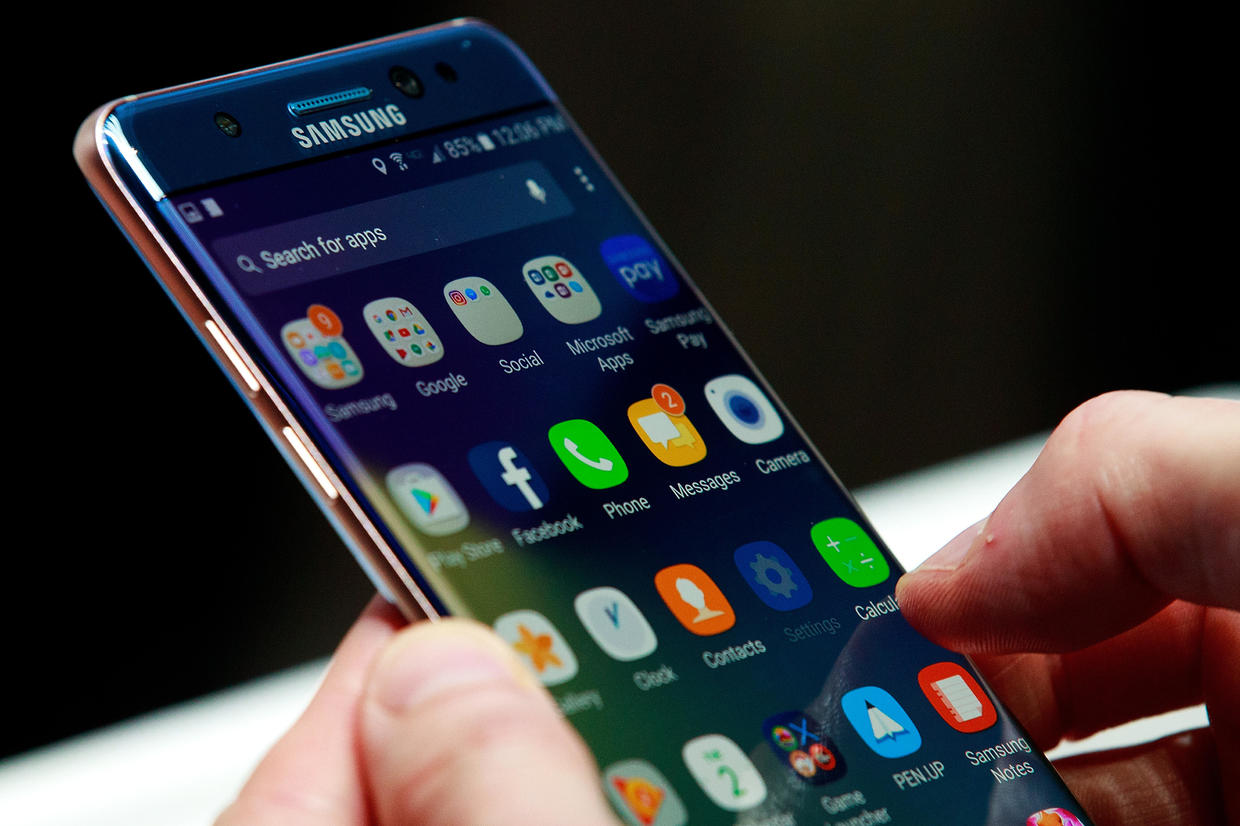Samsung Galaxy Note 7 Recall Background
The Samsung Galaxy Note 7 recall was a significant event in the history of the smartphone industry. It involved the widespread recall of millions of devices due to safety concerns related to the battery. This recall had a substantial impact on Samsung’s reputation and finances, highlighting the importance of rigorous quality control and product safety in the technology sector.
Timeline of Events Leading Up to the Recall
The events leading up to the Samsung Galaxy Note 7 recall unfolded over a period of several weeks, culminating in a global recall.
- August 2016: Initial reports of overheating and exploding Note 7 devices began to emerge from consumers in South Korea and the United States.
- August 24, 2016: Samsung announced a voluntary recall of approximately 2.5 million Note 7 devices in ten countries, including the United States, South Korea, and Australia. The company attributed the issue to a battery manufacturing defect.
- September 9, 2016: Samsung announced a second global recall of all Note 7 devices, including those that had been replaced as part of the initial recall. This decision was made after further reports of overheating and exploding devices, even among the replacement units.
- October 11, 2016: Samsung officially discontinued production of the Galaxy Note 7 and urged all users to stop using and power down their devices. The company also offered refunds or exchanges for affected customers.
Initial Reports of Battery Issues and Overheating
The initial reports of battery issues and overheating were concerning, as they involved instances of devices catching fire or even exploding. These incidents were widely reported in the media, raising concerns about the safety of the Note 7.
- Consumer Reports: Several consumers reported incidents of their Note 7 devices overheating and catching fire, often while charging. Some users described the devices as becoming extremely hot to the touch, leading to concern and potential safety hazards.
- Social Media: Social media platforms became a hub for users to share their experiences with overheating Note 7 devices. Videos and images of damaged devices and incidents of fires were widely circulated, further fueling public concern.
- Airline Bans: Several airlines, including Southwest Airlines, Delta Air Lines, and Virgin Atlantic, banned the use of Note 7 devices on their flights due to safety concerns. This move highlighted the seriousness of the issue and the potential risks associated with the devices.
Samsung’s Initial Response to the Reports
Samsung’s initial response to the reports of battery issues was to investigate the problem and issue a voluntary recall of the affected devices. The company initially attributed the issue to a battery manufacturing defect and assured consumers that it was working to address the problem.
- Voluntary Recall: Samsung’s initial response was a voluntary recall of approximately 2.5 million Note 7 devices in ten countries. This proactive step aimed to address the issue and ensure consumer safety. However, the recall did not address the root cause of the problem, leading to further complications.
- Replacement Units: Samsung offered replacement units to affected customers as part of the initial recall. However, these replacement units were also found to have battery issues, leading to the second global recall.
- Investigation: Samsung launched an internal investigation to determine the root cause of the battery issues. This investigation revealed that the battery design was flawed, leading to overheating and potential explosions.
The Role of the CPSC in the Recall
The Consumer Product Safety Commission (CPSC) plays a crucial role in protecting consumers from hazardous products. The CPSC’s involvement in the Samsung Galaxy Note 7 recall was essential in ensuring the safety of consumers and preventing further incidents.
The CPSC’s investigation into the Note 7 issues began shortly after reports of overheating and exploding batteries surfaced. The agency worked closely with Samsung to investigate the root cause of the problem and determine the appropriate course of action.
The CPSC’s Investigation
The CPSC conducted a thorough investigation into the Note 7 issues, collecting data from consumers, Samsung, and other stakeholders. This investigation included:
* Analyzing reports of overheating and exploding batteries: The CPSC reviewed consumer reports, photos, and videos of incidents involving the Note 7.
* Examining the design and manufacturing process: The CPSC inspected the Note 7’s battery design and manufacturing process to identify potential flaws.
* Testing the battery: The CPSC conducted its own tests to assess the safety of the Note 7 battery.
The CPSC’s Official Statement, Samsung cpsc formal note 7 recall
On September 2, 2016, the CPSC issued a formal recall for the Samsung Galaxy Note 7, urging consumers to immediately stop using the device. The CPSC’s statement emphasized the serious safety risks posed by the Note 7 and the importance of taking immediate action to prevent further incidents.
The CPSC’s statement highlighted the following key points:
* The recall was issued due to a risk of fire and burn hazards: The CPSC cited the numerous reports of overheating and exploding batteries, which posed a serious risk to consumers.
* Consumers were urged to stop using the Note 7 immediately: The CPSC emphasized the importance of taking immediate action to prevent further incidents.
* Consumers were instructed to return their Note 7 devices to Samsung: The CPSC provided clear instructions on how to return the device and receive a refund or exchange.
Impact of the Recall on Samsung
The Samsung Galaxy Note 7 recall was a major blow to the company, impacting its finances, reputation, and long-term prospects. The recall involved millions of devices and resulted in significant costs for Samsung. It also damaged the company’s reputation for quality and safety, leading to a decline in consumer trust.
Financial Impact
The recall had a substantial financial impact on Samsung. The company estimated that the recall cost them over $17 billion, including the cost of replacing defective devices, lost sales, and damage to brand reputation. This financial impact was a major setback for Samsung, which had previously been one of the most profitable technology companies in the world. The recall also impacted the company’s stock price, which dropped significantly in the wake of the recall.
Damage to Samsung’s Reputation
The recall significantly damaged Samsung’s reputation. The company was criticized for its handling of the recall, with many consumers expressing concerns about the safety of Samsung products. The recall also raised questions about Samsung’s quality control processes, leading to a decline in consumer trust in the brand. This damage to Samsung’s reputation was a major concern for the company, as it could potentially lead to long-term negative consequences.
Long-Term Consequences
The recall had long-term consequences for Samsung. The company had to work hard to rebuild consumer trust, and it faced challenges in regaining market share in the smartphone market. The recall also led to increased scrutiny of Samsung’s products and operations, making it more difficult for the company to innovate and launch new products. The recall also had a significant impact on the company’s culture, with many employees feeling the pressure to deliver high-quality products.
Consumer Reactions to the Recall: Samsung Cpsc Formal Note 7 Recall
The Samsung Galaxy Note 7 recall was a major event that generated significant consumer reactions, ranging from frustration and anger to disappointment and concern. Consumers who owned the device experienced a range of issues, including overheating, explosions, and even fires. The recall also had a significant impact on public perception of Samsung and consumer trust in the company.
Examples of Consumer Experiences with Faulty Note 7 Devices
Consumers who owned the Note 7 reported a variety of issues with their devices, including:
- Overheating: Many users reported their Note 7 devices overheating, even when not in use. This was a major concern, as it could lead to fires or explosions.
- Explosions: Several cases of Note 7 devices exploding were reported, resulting in property damage and even injuries. These incidents sparked widespread fear and concern among consumers.
- Fires: In some cases, the overheating Note 7 devices ignited, causing fires. These incidents highlighted the potential danger posed by the faulty devices.
These incidents led to widespread frustration and anger among consumers, who felt betrayed by Samsung. Many felt that the company had failed to prioritize safety and had put profits ahead of consumer well-being.
Public Perception of Samsung After the Recall
The Note 7 recall had a significant impact on public perception of Samsung. The company’s reputation suffered as a result of the widespread negative publicity surrounding the recall. Many consumers lost trust in Samsung, questioning the company’s commitment to quality and safety. This damage to Samsung’s reputation could take years to repair.
Impact of the Recall on Consumer Trust in Samsung
The Note 7 recall significantly eroded consumer trust in Samsung. Many consumers who had previously been loyal to the brand were hesitant to purchase Samsung products after the recall. This loss of trust could have long-term consequences for Samsung, as it could deter potential customers from buying its products in the future.
Lessons Learned from the Recall
The Samsung Galaxy Note 7 recall stands as a landmark event in the consumer electronics industry, leaving a lasting impact on Samsung and prompting widespread industry-wide changes. This recall was not just a logistical challenge; it was a wake-up call for Samsung and a valuable lesson in product safety and crisis management.
The Impact of the Recall on Samsung’s Product Safety Protocols
The Note 7 recall had a profound effect on Samsung’s product safety protocols, forcing a complete overhaul of its quality control and testing processes. The company implemented several key changes, including:
- Enhanced Battery Testing: Samsung significantly increased the rigor of its battery testing procedures, introducing more stringent safety standards and expanding the scope of testing to include real-world usage scenarios.
- Multi-Layered Quality Control: The company established a multi-layered quality control system, involving multiple checks at different stages of the manufacturing process. This ensured that each component, including batteries, was thoroughly inspected before assembly.
- Increased Transparency: Samsung committed to greater transparency with consumers and regulators, providing detailed explanations of the recall and the steps taken to address the issue. This proactive approach aimed to build trust and rebuild consumer confidence.
Industry-Wide Implications of the Recall
The Note 7 recall reverberated throughout the consumer electronics industry, prompting widespread changes in product safety practices and corporate responsibility. Key takeaways for the industry include:
- Emphasis on Product Safety: The recall served as a stark reminder of the paramount importance of product safety. Companies across the industry intensified their focus on safety protocols and risk assessment, recognizing the potential consequences of product failures.
- Enhanced Supply Chain Management: The recall highlighted the vulnerability of complex supply chains. Companies strengthened their supplier relationships and implemented stricter quality control measures for components sourced from third parties.
- Improved Crisis Management: The recall underscored the need for effective crisis management strategies. Companies developed robust communication plans, established clear lines of responsibility, and practiced crisis response scenarios to ensure swift and transparent communication during future incidents.
Samsung cpsc formal note 7 recall – The Samsung Note 7 recall serves as a stark reminder of the importance of product safety and the potential consequences of overlooking critical details. It was a wake-up call for the tech industry, underscoring the need for rigorous testing and transparency in product development. The Note 7’s downfall serves as a powerful cautionary tale, showing us that even the most innovative companies can be brought down by their own mistakes.
Remember the Samsung Galaxy Note 7 recall? That whole “exploding phone” fiasco? Well, it seems like Amazon is getting into the fiery business too, but in a different way. They’re reportedly interested in streaming live sports, which, amazon reportedly interested in streaming live sports , could make them a serious contender in the entertainment industry. But let’s hope their streaming service is a little less explosive than those Note 7s.
 Standi Techno News
Standi Techno News

